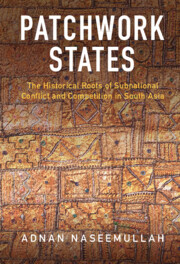Book contents
- Patchwork States
- Patchwork States
- Copyright page
- Contents
- Figures
- Tables
- Preface
- Abbreviations
- Part I Framework
- Part II Historical Roots
- Part III Contemporary Consequences
- 6 Patchwork States and Sovereignty
- 7 Patchwork States and Patronage
- 8 The Patchwork State and Development
- Part IV Conclusions
- Book part
- References
- Index
6 - Patchwork States and Sovereignty
Explaining Political Violence
from Part III - Contemporary Consequences
Published online by Cambridge University Press: 09 June 2022
- Patchwork States
- Patchwork States
- Copyright page
- Contents
- Figures
- Tables
- Preface
- Abbreviations
- Part I Framework
- Part II Historical Roots
- Part III Contemporary Consequences
- 6 Patchwork States and Sovereignty
- 7 Patchwork States and Patronage
- 8 The Patchwork State and Development
- Part IV Conclusions
- Book part
- References
- Index
Summary
In the first empirical chapter, I outline how different subnational governance arrangements, rooted in colonial state building and postcolonial revisions to state structures, shape the patterns of violence in Indian, Pakistani, and Bangladeshi districts. It begins weather discussion of the relationships between state authority and violence, and introduces the key typology of sovereignty-contesting violence (SCV) and sovereignty-neutral violence (SNV). It then surveys the disparate literatures on the various forms of political violence in South Asian countries, suggesting that this typology can provide a way of bridging the divides between these literatures. The chapter then lays out patterns and qualitative examples of these two different forms of violence in the three country. It concludes with a discussion of the limitations of the patchwork state framework in understanding rebellion in South Asia.
- Type
- Chapter
- Information
- Patchwork StatesThe Historical Roots of Subnational Conflict and Competition in South Asia, pp. 133 - 170Publisher: Cambridge University PressPrint publication year: 2022

